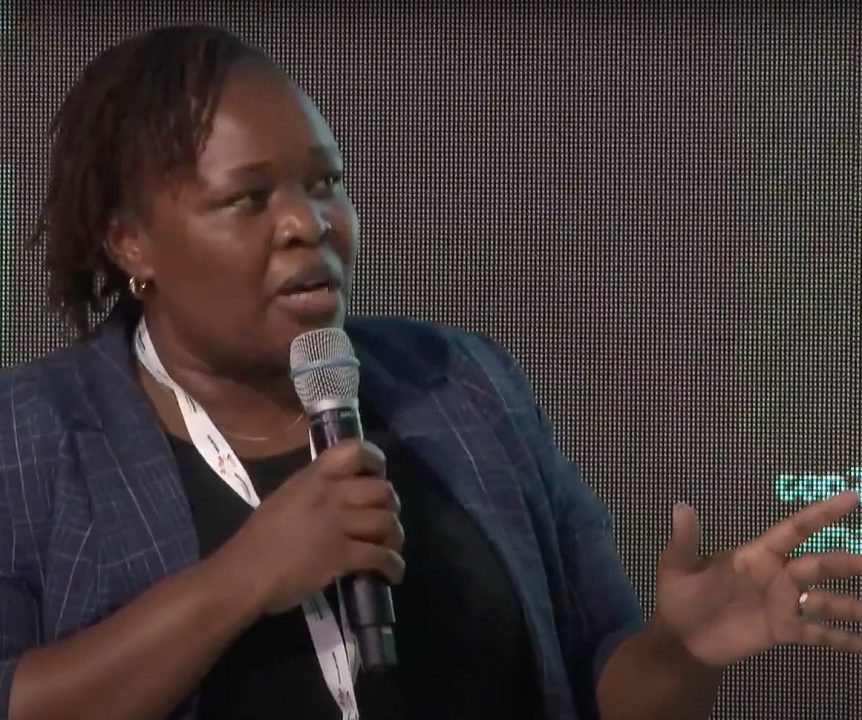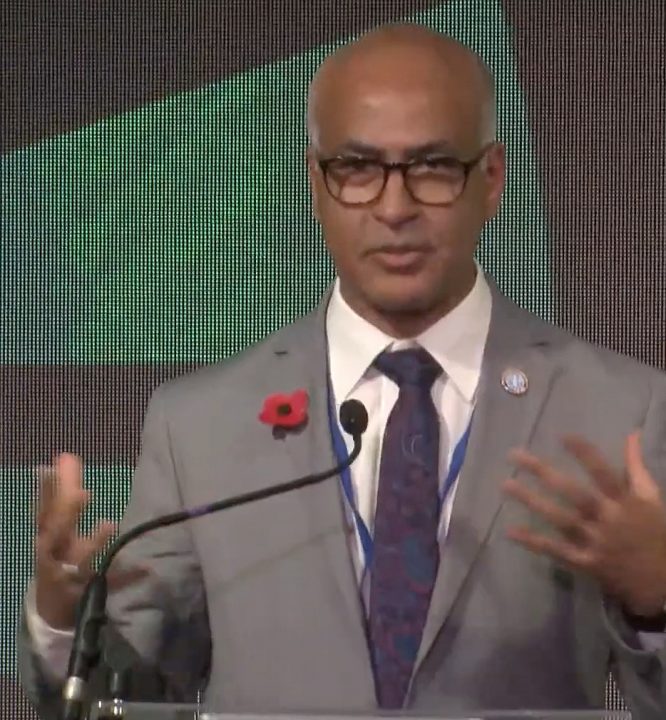The Co-op Group’s food CEO Jo Whitfield joined Fairtrade Africa chair Mary Kinyua for a COP26 session on how producers in the Global South can be involved in the drive to net zero.
New environmental laws and regulations being imposed on supply chains by western governments are having an impact on producer countries and the Agri Food Transformation event at the climate summit highlighted the need to involve farmers when these rules are drawn up, to find fair and effective ways to implement them.
With the 1.5 degree target hanging in the balance, the issue is a critical one. Ms Whitfield said: “I think we take for granted that food will be available and almost see climate change as an academic or intellectual issue, whereas actually it’s a really pressing priority for food security as well.”
She said the Group, as a leading supporter of Fairtrade, was playing a role in finding globally just solutions to the crisis, while the model of of co-operation is also an effective too. It is also important for all big businesses “to recognise that when they are part of the process, it is time to take responsibility,” she added.
Ms Kinyua, a flower grower from Kenya, said producers had learned to adapt to crises like climate change. “Every time is innovation time,” she said, adding that farmers have to adapt every time a new regulation comes into place.
Related: Co-op Group and Kuapa Kokoo talk sustainability at COP26
Certain fertilisers or farming practices might be outlawed by European governments to protect their pollinator species, she said, but this meant farmers in Africa have to work hard to adapt – while having no representation in the regulatory process.
“When you block a particular fertiliser you are requiring me to find an alternative,” she said, adding that she struggled to imagine how “all the beautiful things you say” at COP26 can be put into action on her farm.
More collaboration is needed, she argued, with farmers co-creating the new framework with legislators, so it can be more effectively put in place
Ms Whitfield said western businesses and governments “have got to help producers deal with a challenge that they haven’t created”.
With the Group’s own plans for net zero by 2040, “We’re thinking really widely about the role every business, every industry, every family, every community, every country and every government’s going to have to play to join us”.
She said the Group’s relationship with Fairtrade “is really helpful because what we recognise is there is a real need for climate justice”, with the crisis harming communities that already have challenges over nutritious diet, children’s education, and health infrastructure – “things we take for granted”.
The Fairtrade Premium must be used to to help producers enact the changes “so we can have a sustainable food chain”, she said, alongside wider “structural systemic change” with ambitious political leadership and an ambitious aid programme.
Fairtrade is “the gold standard” in empowering producers, who are “dealing with the changes we in the global north are leaving them to deal with,” she said.
Ms Kinyua said producer countries – whether in South America, Africa or Asia – are already feeling the effects of climate change, pointing to the hailstorms that ruined crops in Uganda last month and the droughts in Kenya. But shutting down supply chains to curb emissions also hurts producers, such as the thousands of workers involved in Kenya’s flower growing industry.
For a farmer in Ghana, whose life is about day-to-day survival, new regulations are a matter of “dictating to the hungry man”, she said, adding: “Why can’t we work together to create a shipping solution, for example, that has much much lower carbon emissions?”

African farmers have to apply rules made in Europe, argued Ms Kinyua, and efficient, co-operative organisations like Ghanaian coffee co-op Kuapa Kokoo are well suited to helping co-create such rules and get new innovations to farmers.
Ms Whitfield said good steps had been agreed at COP26 but there is more to do, and it is time to “move beyond denial and start making aspirational plans with deadlines”.
All businesses need to be more transparent and to work together, sharing knowledge, and governments need to legislate and incentivise to drive this change.
Ms Kinyua said COP26 had at least been an improvement in terms of participation, with lot of youth, women, and farmers offered discussion and agency. “Listen to the farmers” she said. “We are the context. We really are creating solutions.”
Keynote speaker at the session was Zitouni Ould-Dada, deputy director of the Climate and Environment Division at the UN Food and Agriculture Organization (FAO).

Dr Ould-Dada said: “Basically we have nine years left to fix climate change. Sadly, we’re not going to be able to stop climate change we lifted so late. What we’re trying to do is to avoid the danger of climate change.”
Among the necessary solutions is the need to make agriculture more efficient, with a fairer, less wasteful system. “Shifting mindset is absolutely key.” he said. “When we talk about transformation of food systems it includes our lifestyle, our choices matter a lot.”
Around the world, 811 million people are going hungry – but 2 billion people are either obese or overweight, while the world throws away a third of the food produced for human consumption.
“It’s immoral,” he said. “And that one third is responsible for around 8% of greenhouse gas emissions. So if food loss and waste were a country, it would be the third biggest emitter.”
Food production methods are wasting water, energy, nutrients and soil, he said, but consumers are shielded from this reality.
“We don’t ask many questions about where our food came from and when we throw it away, we don’t know what happens to it,” he added. “We really need to reconnect better with food. We need to value our food. When you value something you don’t throw it away. I don’t think any of us throws our mobile phones way.’
This transformation needs to be “fast and at scale”, he warned, because “climate change is so fast compared to the actions we’re taking. Covid 19 gave us a good demonstration of what destruction would look like – the whole food system has been shown to be vulnerable.”
Severe weather events are going to become more frequent, and in places where they are not normally seen, as witnessed last summer in Belgium, Germany, the US and China, he added.
“Agriculture is part of the problem and is also an important part of the solution,” he said. “I mean innovation in the broader sense, not just innovation in terms of technology, but innovation in terms of the local knowledge, the traditional and indigenous knowledge as well. That’s also part of the innovation. People have the experience in their local circumstances and conditions. And they are forced to innovate, to adapt to the changing conditions.”